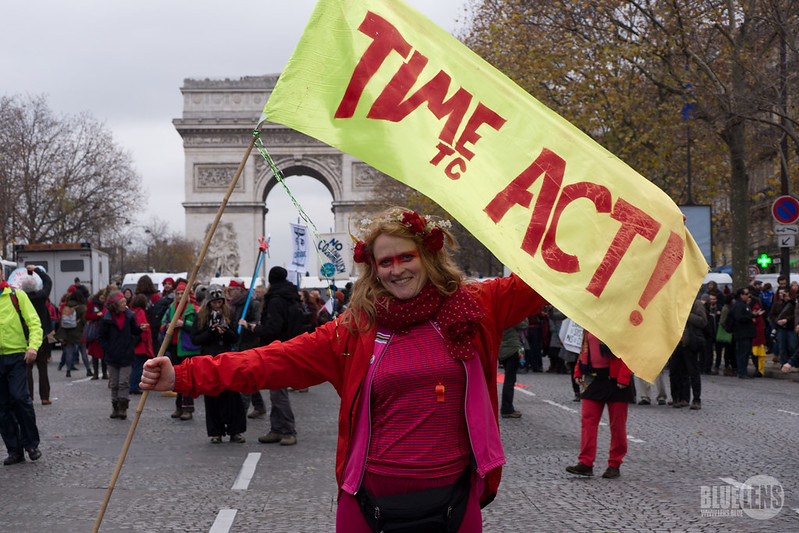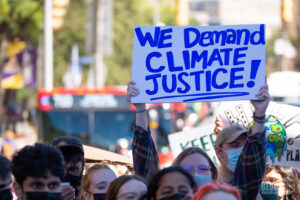transform! Europe supports the joint letter to the United Nations Framework Convention on Climate Change (UNFCCC), originally initiated by Global Justice Now and signed by numerous organisations, networks and individuals. The full text of the joint letter can be found below.
Ratified by 198 countries and entered into force in 1994, the United Nations Framework Convention on Climate Change (UNFCCC) initially brought hope to millions of people who were already experiencing the brunt of a warming planet. Since then, frontline countries and communities in the global South have rightfully called for climate justice, for actions and reparations that are commensurate with the environmental destruction and consequent hardships they are already facing, and for the countries in the global North and fossil fuel corporations to address their historic responsibilities.
The UNFCCC is the main political arena for global governance – informed by civil society advocacy – when it comes to climate change. Each Conference of Parties (COPs) has offered opportunities for governments and non-governmental organisations to identify how to resolve this greatest challenge that all species are facing.
In its latest 2023 Synthesis Report, the 6th in the series it has produced in the past three decades, the Intergovernmental Panel on Climate Change (IPCC) has warned us once again that critical climate tipping points are already occurring together with extreme weather events. The latter have disproportionate impacts on poorer countries, peoples and stressed eco-systems. New studies also show that we are set to breach the 1.5C threshold within this decade; at least one of the years, over the next five year period, will register 1.5C heating on a global scale with devastating consequences. Our climate as a whole has shifted from a previously stable state to a definitely perilous one. The main contributor to this is fossil fuels.
The UNFCCC’s intimate partnership with the very corporations that have created the climate crisis is not confined to the ever-increasing numbers of fossil fuel and other corporate lobbyists who attend COPs. Now, after 27 COPs, it is clear that the process has been captured by the conglomerates, financiers and other transnational corporations that have profited from producing the current untenable levels of greenhouse gases in the atmosphere and who have delayed serious transformative action.
We find it disastrous that the upcoming COP28 in Dubai will be presided over by Sultan Ahmed Al Jaber, CEO of the United Arab Emirates’ state-owned Abu Dhabi National Oil Corporation (ADNOC). This is not merely a clear conflict of interest. With ADNOC’s spectacular plans for oil and gas production expansion, it is a profound signal that the major greenhouse gas emitters will continue profiteering while our planet burns and without addressing their historic responsibilities. This raises the question whether the UNFCCC is fit for purpose to meet the challenge of the climate emergency.
It is clear that the UNFCCC is failing the peoples of the world and all species that rely on a healthy planet to survive and prosper. The failure to limit the increase in average global temperature, and the inadequate climate finance available to compensate those already suffering and those who need to take drastic and expensive climate-proofing steps, reflect a failure of world elites to change course.
We have painfully observed how powerful, high-emissions states threaten, bully and bribe poor countries into submission at the COPs. We are aware that behind the many compromises reached in the agreements, preventable deaths and economic misery are locked in for hundreds of millions of people. In the eight years since the ratification of the Paris Agreement, there has been mainly unfettered expansion of big powerful corporations in the oil, gas, coal, mining, construction, transport, agriculture, logging, aviation, shipping, fishing and other sectors.
It is time to address the failures and growing democratic deficit in the UNFCCC. For almost three decades the UNFCCC has not been able to lock in substantive and just systemic change within climate policies, while the climate crisis is worsening. The elites refuse to address those on the frontlines of the crisis. As the world confronts more provoked and increasingly intense and frequent climate-related catastrophes and new pandemics, climate-vulnerable countries, many of which are also the poorest and highly indebted, continue to suffer. They are the ones that climate debts are owed to by the historic emitters, largely from the global North.
Climate reparations are needed, first to start a path to detain the causes of global warming, to incentivise a drastic curtailment of emissions, to compensate those already suffering Loss and Damage because of climate change, and also those with huge adaptation costs needed by their societies. The Loss and Damage Transitional Committee has already held two of the four meetings in its work plan to hammer out the implementing mechanisms of the new funding arrangement agreed at COP27. This body must be guided by the principles of common but differentiated responsibilities, social justice and global solidarity.
The discredited and unrepresentative forces within the UNFCCC must be challenged, and the 28th COP in the United Arab Emirates must be exposed for what it is – an unacceptable kowtowing to fossil fuel corporations and other mega-polluters. The high-emitting countries, companies and tycoons can play a part, and serve the people and the planet more broadly, first by beginning a drastic curtailment of fossil fuels in the countries in the global North and big emitters in the global South, for eventual phase-out, based on justice and equity.
Moreover, the global stocktake of emission reduction commitments needs to also address investments and subsidies for fossil fuels by banks, governments and corporations. In addition, provisions have to be made in UN stocktake reporting for submissions from nationally based movements and concerned citizens. A government-led process has not worked and needs to be democratised with such measures so frontline communities resisting further extractivism can also have a voice.
The elites must also pay their climate debts and thus provide for the much-needed Just Transitions to non-corporate or expansive renewable energy to support an overhaul of our economies to start the many radical changes required to save our planet and our lives. Anything less, than the measures proposed to address the democracy deficit in the UNFCCC, will lead to the complete delegitimisation of the UNFCCC and all those who influence global climate policy.
Contact person: Dorothy Guerrero, Head of Policy and Campaigns at Global Justice Now (dorothy.guerrero[at]globaljustice.org.uk)



